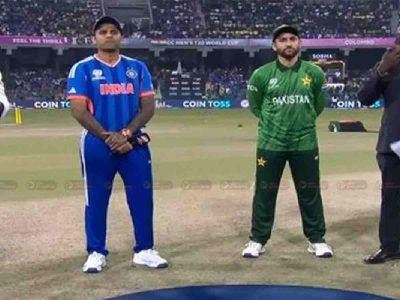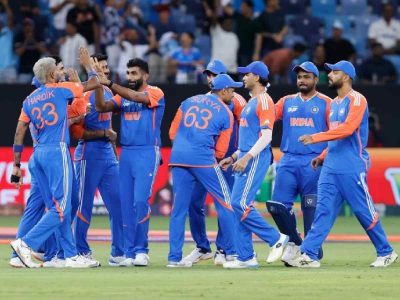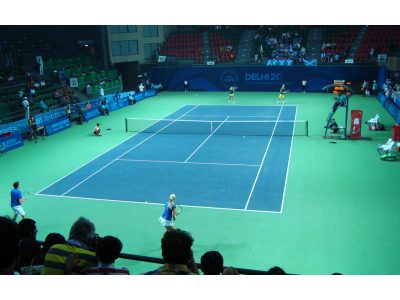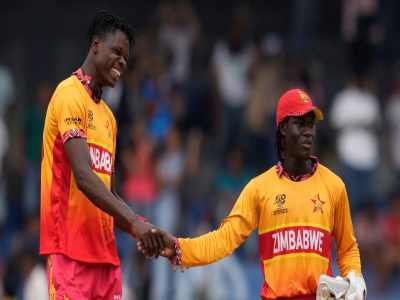Chhatrasal has produced world class wrestlers, won five Olympic medals for India. After Ravi Dahiya and Bajrang Punia it will be Aman and Rahul in the next Olympics
Chhatrasal Stadium is one of the best training grounds for wrestlers in the world. Thanks to this one institution India has won five Olympic medals and many more world wrestling championships, Asiad and Commonwealth Games medals—the list is long. Chhatrasal is an institution that has had a profound impact on Indian sports and will continue to do so in the future as it has a big pool of talent, some of whom look set to become great wrestlers and make India proud. The most recent two are Ravi Kumar Dahiya who won the silver medal in freestyle wrestling of 57 kg category and Bajrang Punia who won the bronze medal in the 65 kg category.
They were both contenders for Gold medals, while Bajrang had won gold in the 2018 Asian Games and silver in the world championship. Ravi was also in a confident frame of mind, with two successive Asian championships gold and a bronze at the world championship. They are the new heroes of Chhatrasal, and are an inspiration to the younger lot. Coach Jaiveer says, “It was Sushil who made us believe that we can do well in power games at the highest level.” And the blessing of Gurus like Satpal ji, Ramphal ji and Yashveer Dabas.
Coach Jaiveer, 35, is a proud member of the Indian Air Force, lives in Chhatrasal and trains prodigies into world class wrestlers. He’s hopeful that the two will improve their performance in the next Olympics by winning gold medals in their respective categories. He’s equally hopeful for the younger lot who will represent India in the international arena for years to come.
He feels dozens of wrestlers who train in Chhatrasal can do well in the future, all have the potential, but the two names stand out. Aman, who just turned 18 years old, has been living in Chhatrasal since he was 10 years old. He’s an orphan and “Chhatrasal is his family,” as Aman puts it without the slightest hesitation.
Jaiveer is all praises for him. The gruelling training session every day that starts at 5 in the morning, and carries on for a good part of the day, is not sufficient for Aman. He’s seen training longer than required. It’s a passion for him, some sort of a necessity, it does well to him.
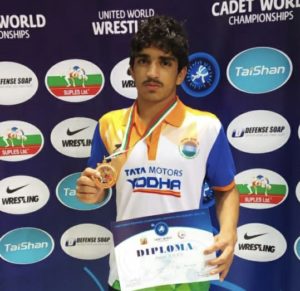
Aman is a man of few words, speaks in a direct way. Now in college, he joined Jat College in Rohtak. He has no distractions. Do you play any other sport? “No,” is his spontaneous response, and then mulling the question for a bit, “sometimes play basketball for manoranjan (entertainment),” he adds. He doesn’t watch television, movies, hardly ventures out of the stadium, where he lives with two other wrestlers in a big room.
He has participated and won competitions in many countries—finds it difficult to list the countries that he has been to—could think of four: Iran, Bulgaria, Kazakhstan and Croatia.
The list of competitions he has already won makes him a big contender for winning India’s first Olympic gold in wrestling: Sub Junior World Championship in 2019 and 2018 and Sub Junior Asian Championship in 2019; Under 15 Asian Championship in 2018. This list of national championships he’s won includes some 10 titles.
“Aman is our strongest junior player who has the potential to do wonders at the world level wrestling,” Jaiveer says without an iota of doubt. And he gets emotional thinking about how Aman transformed himself in all these years. He makes a special mention of two Olympic medal winners, Sushil Kumar, who has been very supportive of Aman, also financially, almost like a foster family.
The second name is that of Rahul, 21 years of age, is from a humble family residing in Bahadurgarh and has been living in Chhatrasal, for a decade now. He has many victories to his credit like gold in Junior Asian Championship 2017, 2020; has won many gold medals in the national championship—consecutively for three years—2017,2018 and 2019.
Rahul is an expert wrestler but has little life beyond the Chhatrasal. On a free day, which is Sunday, he relaxes. And what does relaxation actually mean? “I sleep a little longer. The body needs rest,” he says. But he trains, albeit with not usual intensity, even on a Sunday. He can’t recollect the names of the countries he has been to but explains cogently the culture of Chhatrasal.
Rahul explains all wrestlers train in the traditional way, practice together–whether an Olympian or a fledgling. “I have learned a lot practicing and having bouts with the best. Including the likes of Sushil Kumar, Ravi Dahiya, Bajrang Punia. We live together, eat together, train together under the vigilant eyes of coaches,” he elaborates.

For a normal young man of Delhi, this kind of lifestyle may seem a big sacrifice, to devote the formative years to playing and training for sport. For Aman and Rahul it’s the only thing that gives satisfaction and purpose to their life. And the learning process itself is engaging and challenging at the same time.
Coach Jaiveer explains that each of the wrestlers is attached to a relatively senior wrestler, who hones his talents, and helps him realise his true potential. They are part of a larger group and there are many groups. In the case of Ravi Dahiya, Arun Kumar was his sparring partner, also roommates for many years, and very good friends as they belong to the same village in Sonipat.
Arun, 31, an accomplished wrestler in the 70 kg category accompanied Dahiya to Vladikavkaz in Russian earlier this year to help him train for the Olympics. “Arun Kumar ka aham yogdan hai Ravi ki success mai (made an important contribution in Ravi’s success),” says Jaiveer.
Aman and Rahul too have their groups, and their group members challenge them to formulate new strategies. Stamina is the strength of Indian wrestlers. Jaiveer lays stress on a healthy diet and hard labour and practice. They never forgot their gurus—Satpal who started it here in 1987 by digging a wrestling pit. “Guru Satpal couldn’t win an Olympic medal himself, that’s why he created this great institution and would ensure generations of world class wrestlers winning Olympic medals for India,” says Jaiveer and adds, “next time it has to be gold medals.”


